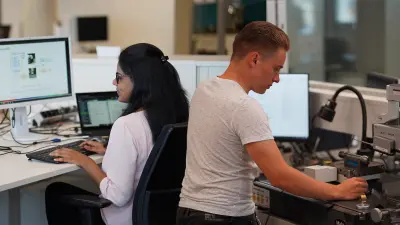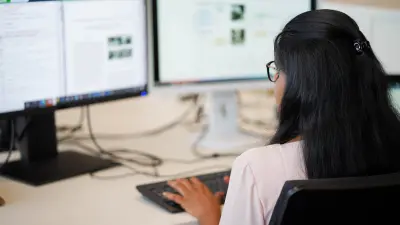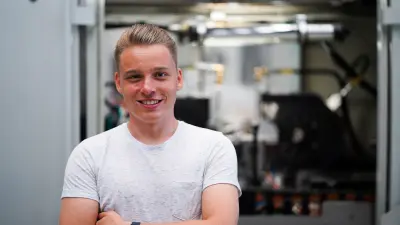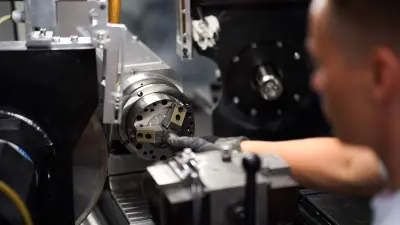Excellent from the start

The world is in turmoil: scorching heat waves, soil-parching drought, the melting ice masses of the Arctic that could change the Earth’s ecosystem forever. At Bosch Research we need people who are already thinking about the future and ideas to change our way of living in order to make a positive difference. The Bosch doctoral program gives such people an opportunity to live their convictions. Especially in connection with AIoT, our research offers opportunities to integrate sustainability, efficiency and responsibility into peoples’ everyday lives as well as into business and industry. The PhD program at Bosch combines theory and practice at every stage.
Learning and optimizing
“Artificial Intelligence can definitely change the world for better if it is used properly,” says Amrutha Saseendran. The 28-year-old joined the Bosch PhD program in 2020. It was a conscious decision. After completing her master’s degree in “Information and Automation Engineering” at the University of Bremen, Germany, Amrutha was looking for an opportunity to earn an industrial PhD in Artificial Intelligence (AI) – and she found it at Bosch Research. More precisely at the Bosch Center for Artificial Intelligence (BCAI). She is now focusing on the topic of “optimization in the latent space generative models” as part of the Reinforcement Learning and Optimization team at the BCAI. Amrutha explains her topic in simple terms like this: “Let’s say you have a collection of toy cars. I can essentially provide you with a design for a faster or more efficient toy car.” What sounds simple is quite difficult: Amrutha is exploring ways to generate novel product designs that are based on existing designs. These new designs are refined in a certain way, like reduced material cost and improved performance. “In general, this is a complex optimization problem, and the idea is to use generative machine learning models to reduce this complexity in the search space,” she explains. Her work combines two essential elements of AI research at Bosch. First, utilize and train novel generative machine learning models to learn an efficient latent space with a relatively low dimension of the original input space of the already existing designs. Second, perform efficient optimization in the learned space for novel and optimized designs. Amrutha especially enjoys working on challenging state-of-the-art concepts in the program and is also happy that her work has a direct impact on Bosch’s products and services.

Amrutha Saseendran

Amrutha Saseendran has been a PhD student at BCAI since 2020. After earning a bachelor’s degree in “Electronics and Communication”, the native of southern India worked as a software developer for two years. Her next stop was Bremen, Germany. Amrutha completed a master’s degree in information and automation engineering at the university there. She wrote her master’s thesis as part of an internship at the German Aerospace Center (DLR Deutsches Zentrum für Luft- und Raumfahrt).
Dissertation topic at BCAI:
Optimization in the latent space of generative models
Objectives of the work:
- To generate novel and optimized product designs for better performance.
- To pool the existing knowledge from different business units of Bosch and use the data to find the factors that affect optimized designs.
- To gather existing optimization data and generalize it in order to create new efficient designs including electric motor or engine designs.
Emil Sauter

Emil Sauter has been a doctoral student at Bosch Research since 2019. Emil, a native of the southern German region of Allgäu, developed an interest in mathematics and physics while in secondary school, a fascination that extended well beyond his classroom work. At the University of Ulm, Germany, he studied “Computational Science and Engineering”, a program that combined mathematics, computer science and mechanical engineering. Emil joined the PhD program at Bosch immediately after completing his master’s thesis.
Dissertation topic at Bosch Research:
Detection and avoidance of thermal damage in grinding by using hybrid learning models
Objectives of the work:
- To develop an intelligent condition monitoring system for machine tools to detect process defects by using hybrid models.
- To implement optimization algorithms for an adaption of the process parameters in order to achieve a reduction of overall costs, an increase in production, and an improvement of the quality of the final product.
- To enable every manufacturing process to be equipped with monitoring or optimization methods using artificial intelligence in the production of tomorrow.

Solving problems
The desire to research future topics brought Emil Sauter to Bosch Research and its PhD program. The 26-year-old entered the Bosch doctoral program in 2019 after completing his master’s degree. He is particularly interested in enhancing manufacturing and production processes by means of artificial intelligence. His dissertation topic is “Detection and avoidance of thermal damage in grinding using hybrid learning,” an area that holds much promise for industry. Emil explains his work this way: “When you grind metal, the friction between the grains of the grinding tool and the component creates extremely high levels of heat. If the grains become blunt, the surface of the component can burn, and it can no longer be used.” To address the problem, he has developed a computer model that works like the human brain and can distinguish between thermal damaged parts and unburned parts. “The goal is still to adjust the speed of the grinding wheel so that, as far as possible, no more parts are thermally damaged,” he says. The problem occurs repeatedly in industrial production: Thermal damage to metallic components can lead to failure of the component during operation. But that is far from the only problem that occurs in the process: The greater the wear progress of the grinding tool, the higher the likelihood of grinding burn.
At the moment, this can be checked after the process costly on a random basis. In his research project, Emil is focusing on ways to detect and avoid thermal damages. This work includes the development of an in-process-capable monitoring system that uses machine learning to predict the degree of thermal damage by evaluating acoustic emission and electrical spindle current signals. With this information in hand, employees should be able to draw a model-based conclusion about the current state of the grinding tool. “The final goal of the dissertation is to adapt the process parameters so that the useful lifetime of a tool can be extended without thermal damage to the component,” Emil says. He is doing pioneering work here because using artificial intelligence results in a huge potential to improve the quality of future products and reduce costs in various manufacturing processes.
Improvement through AI is also Amrutha's main focus. “The field of AI has revolutionized almost every domain of our lives,” she says. AI can help eliminate tedious human jobs or efficient automation of processes. She is also focusing on learning from the existing data. Such work can improve the robustness and performance of dynamic systems, optimize the manufacturing process, generate novel and efficient product design and facilitate novel and efficient chemical drug discovery. With passionate researchers like Amrutha and Emil, the future cannot start early enough.